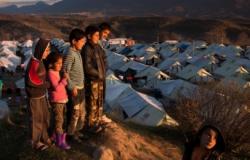Migration Cannot Be Cast In Terms Of Individual Rights

The Jungle in Calais is closed and the deal with Turkey is in place. Is the refugee crisis over?
Not at all. The refugee crisis is first and foremost about refugees, not about migration to Europe at all. It became very salient once refugees or some refugees, a relatively small minority, started moving to Europe but the roots of the crisis were that we’ve got a refugee system which doesn’t work for refugees.
And so we urgently need to reform that system so that it works for refugees and for everybody else. It has been unreformed since around 1950 and is completely unfit for modern purpose. It was designed for a completely different set of problems and manifestly it doesn’t work.
The German Chancellor has introduced the idea of a migration partnership first and foremost with Africa. What kind of cooperation with African countries is most needed?
Well, first of all, I’m very glad that the German government is indeed now giving very serious attention to African economic development. I think that’s the right thing to do and now is a good time to do it because Africa faces rather challenging economic circumstances and so it’s important that we do what we can to help. I think it’s unfortunate that it’s cast as a strategy to prevent migration. I’ve been working for 40 years on trying to help Africa to catch up with the rest of the world and I think that’s a vital first order matter.
I don’t see it as mainly vital in order to stop migration, but rather because there are a billion people living in environments which are not now offering any credible hope of decent lives. And so both out of elementary concern for other human beings and out of enlightened self-interest we should do something about that. Do what we can. Having a neighbouring continent that falls behind or that is a long way behind is obviously both a tragedy for that billion people and a potential source of global instability.
When you talk about catching up and helping Africa to catch up what role does migration play in this process? Your book Exodus talks in great detail about the ambiguous role of migration…
Yes, that’s exactly the right word. Migration is always a matter of numbers and that’s why it can’t be cast in terms of individual rights. If one person migrates that’s good, if 100 million people migrate that’s bad. Not just for the host country but for the country that’s losing people. A lot of small poor countries are losing too many of their most educated and most enterprising people and that is…
That’s the brain drain argument.
Yes, and having some emigration is beneficial, you can have too much as well as too little, so it’s a matter of trying to work out how much is ideal and researchers have tried to do that. And the conclusion is that many poor countries, especially the smaller ones, which is typical of Africa, are losing too many of their brightest and best educated people.
So brain drain is not a myth in that context.
Yes, that’s right. And in fact it’s not just a matter of Africa; it’s also true of the poorer countries in Europe. There was a study by the IMF just last month which concluded that emigration from Eastern Europe had delayed catch-up. But, of course, the people themselves benefit and the host countries benefit. But there are many people left behind and the solution cannot be that a whole country empties. Obviously, that is not an appropriate or a feasible solution. And so policies have to be driven primarily by the idea of what helps the people who stay in the country to catch up as fast as possible.
But don’t remittances play a positive role? They are basically on par with foreign direct investments in many cases…
The typical migrant sends back about $1000 per year so about $3 a day. Meanwhile, the country has lost the output that those people would have produced had they stayed in the country. And so you’ve got to ask would they have produced more than that and if they’re bright and educated and enterprising the answer is: Pretty likely. So having remittances is better than not having remittances but the remittances come at the price of the lost output of the people who have left. And the lost output may well be bigger than the remittances.
That’s why what the G20 is focusing on is how can we raise investment into Africa. The focus is not on how we can stop people coming at all. The focus is on how can we raise investment and hence raise output and productivity in Africa, consequently creating more opportunities. Africa has to be a continent of hope for the people who live there.
That seems to make a lot of sense as a general objective, doesn’t it?
Yes, I think so. Hope not based upon wild dreams but hope based upon practical things: Better infrastructure, better environments for firms to produce things.
Exodus also mentions the concept of a safety valve effect. Do you feel that in an age where migration is increasingly unregulated we will witness the end of revolution? Because people will just not call for change; they will just try to find a better life somewhere else.
Well, clearly the people most likely to promote the required change are younger, able, educated people. Some exposure to Western societies helps. So, for example, when students come from Africa to study in Europe and then go back that’s very helpful to Africa. Not only does it bring back skills but it brings back ideas which we can show assist the process of change. So migration which involves people going back is, I think, very beneficial.
There’s some transmission back of ideas from diasporas but return migration is really effective. And the safety valve point you were setting out, yes, I think there’s long been an idea that people who are living in a dysfunctional environment have a choice between voice and exit. And the more they choose voice the better for everybody. The more they choose exit, it might be better for them but it’s worse for everybody else.
You have frequently travelled to Germany in the last couple of months. How do you perceive the German debate on migration?
I think quite generally in Europe discussions have become unpleasantly polarised and sort of unpleasantly moralised. As if there are good people and bad people. And what I would hope to see is the emergence of a moral consensus that we do have some responsibilities to help much poorer societies.
We have responsibilities towards refugees but the way to fulfil these responsibilities is not to take a lucky few out of those contexts but to do things that work for all. In the case of young Africans wanting hope, clearly the solution to that can’t be to bring every young African that wants to live in California to the United States. It clearly has to be to bring the opportunities to their societies.
In the case of refugees, the heart of the refugee problem is flight motivated by fear. Half of the population of Syria has fled their homes out of fear, obviously well-justified fear. That population of displaced, about ten million people, that should be our focus of concern. Most of those people are still stuck in Syria because the neighbouring haven countries have at times closed their borders. And the reason they’ve closed their borders is that the neighbouring countries have been given so little international support until much too late.
But still four or five million people have crossed the borders out of Syria and where they choose to go to is the neighbouring havens. And there’s very good reason for that. It’s easy to get to, it’s easy to get back from, when the conflict’s over and the challenge then is to bring employment opportunities to refugees in those havens.
We’ve got a model of dealing with refugees, UNHCR, which is still stuck in 1950 where refugees are seen to be needing food and shelter. That would be true if refuge was a matter of a few months or a few weeks but 90% of refugees, the refugees who have fled Syria and globally, actually ignore UNHCR because their top priority is not food and shelter. If you’re going to be a refugee for some years your top priority is to be able to earn a living. And at the moment the haven countries for quite good reasons don’t provide the right to work. Because their own populations feel threatened. And what we as an international community should be doing is bringing work to the refugees in those havens.
How can that be facilitated?
Given modern globalisation that is entirely feasible. Germany’s been doing that, bringing jobs to Turkey for years and now we can scale that up. That’s starting to happen in Jordan. It’s very exciting, it’s also starting to happen globally, that’s why Chancellor Merkel went to Ethiopia to see an industrial zone which is now scheduled to provide jobs both for refugees in Ethiopia and jobs for Ethiopians. We can make deals which work both for the haven governments and for the refugees.
It is much more feasible to do that than to bring refugees to Germany or anywhere else. At the moment, if we look at global figures, we’re spending 135 dollars or Euros for every refugee who makes it to Europe for every Euro that we spend on the refugees who stay in the havens. This is a massively skewed distribution of assistance towards a privileged few and, of course, the refugees who reach Germany tend to be young, male and educated, very disproportionately. The least needy category of refugees.
You mentioned the convention relating to the status of refugees from 1951, the UNHCR refugee convention. Do you feel that this needs updating?
It’s become largely irrelevant to look at the convention. It was designed to help individuals who were persecuted by governments where there was no prospect of the regime changing so that the focus was on resettling people in the West. The original convention was also limited geographically to western Europe and was limited temporarily so it wasn’t to apply to anybody who became a refugee after January 1950.
It’s still there in a placid piece of Eurocentrism. In 1967 it was declared to be a global convention. It isn’t a global convention, it never has been and it never will be. Most refugees are in ten haven countries, none of the governments of those ten countries were signatories to the convention. So it’s irrelevant. Modern refugees are overwhelmingly not persecuted individuals, they are groups fleeing disordered state breakdown, famine, that sort of thing.
So we’ve still got this label, refugees, but they’re a completely different problem and they need a completely different response. The decisions that matter for refugees need to shift out of court rooms into board rooms because what will provide jobs for refugees is not some judge, it’s the boards of the major international companies.
Can you elaborate?
There are two components to the present refugee regime, one is this convention which is basically irrelevant, it’s not even worth revising, it’s just irrelevant. And the other component is an agency: UNHCR. UNHCR is a purely humanitarian agency: it doesn’t have an economic competence or mandate. And so it is not remotely equipped to meet the needs of refugees. That’s why 90% of refugees ignore it.
So either UNHCR needs to be completely reinvented, re-equipped, re-staffed, re-mandated, or the job needs to shift out of UNHCR to the economic agencies like the World Bank. So, for example, earlier this month the World Bank’s board approved concessional loans to provide jobs and to provide education to refugees in Jordan and in Lebanon. The amazing thing was not that these steps were taken, but that they were the first refugee loans the World Bank had ever done. At last agencies like the World Bank are stepping up to fill this void, at last they feel that they have permission to try and do that. UNHCR has been a big sort of “keep off my turf agency” for many years.
So you are not overly optimistic in terms of changing the mandate or reinventing UNHCR, but are rather suggesting to basically just sideline it?
I’m agnostic. I don’t mind and I don’t care as long as it is done. What I think is needed at the very least is competition between agencies. Monopoly is always bad and having a monopoly agency has been very damaging. And so yes, we need other agencies at the table, not just public agencies, there’s NGOs, businesses, but they need to be aligned on what is the real thing we’re trying to do and it starts, first and foremost, with jobs. That’s what refugees most need. They need to be able to earn a living and get dignity from a job and hold their families together whilst they’re refugees. In the process we can actually incubate the post conflict economies whilst they’re still in conflict if we can get firms to go to the havens. Incubating the post conflict recovery even before the conflict is over is a very sensible thing to do.
But it should be done in Jordan, not in western Europe if I understand you correctly.
Of course. Germany’s not an appropriate place to providing employment, in Germany, for refugees, because Germany is the ultimate high-skilled training qualifications/ certifications society. It has a very productive labour force but it’s based on long period apprenticeships. It is ill-suited for a big sudden influx of refugees who are there temporarily. I saw a survey reported in the Financial Times back in June, the top 30 German companies…
About the 54 refugees?
The 54 refugees. Germany has taken the brightest and best that Syria had to offer and then not used them. If you’d taken jobs to those people it would have been much more feasible.
Paul Collier spoke with Michael Bröning, Head of the International Policy Department of the Friedrich-Ebert-Stiftung. A German version appeared first in Internationale Politik und Gesellschaft. This post first appeared on Social Europe Journal.
Photo credit: DFID - UK Department for International Development via Foter.com / CC BY-NC


